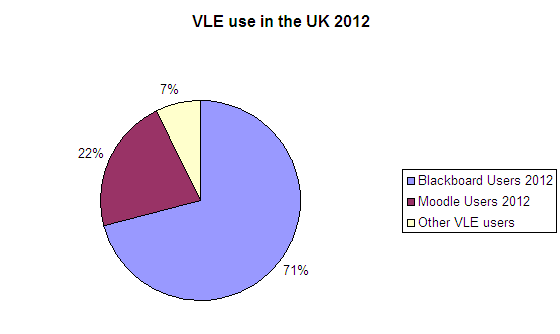First, I’d better come clean. This data isn’t mine – it’s from a publicly available spreadsheet produced by Matt Lingard, and you can get the full set at

First, I’d better come clean. This data isn’t mine – it’s from a publicly available spreadsheet produced by Matt Lingard, and you can get the full set at

A few weeks ago I posted a comparison of what have become the two leading VLEs in UK higher education, namely Blackboard and Moodle. I don’t want to get into arguments about which is “best” here because any system is only ever as good as its users. We have some excellent Blackboard sites across the university that take full advantage of the available functionality, but that’s by no means universal.
However, a number of institutions are apparently moving from Blackboard to Moodle, ostensibly because of the much lower costs associated with the latter. However, it seems, according to members of the Association for Learning Technology, whose mailing list I follow, that the transition is not a simple one. (It’s a subscription only list, so I won’t post a link to the relevant postings). I quote: –
“We moved from Blackboard to Moodle just over a year ago and at that time there was no way of bringing material (courses, forum, documents etc.) into Moodle from Blackboard, I presume that is still the case I suspect that the two databases are just to different to map tables and content to each other in any meaningful way.”
A number of other contributors describe similar difficulties. What that means is that were we to move, every single Blackboard site would have to be recreated afresh. As another contributor to the list pointed out, that’s actually a good opportunity for an institution to review its e-learning provision. I’m not aware that Lincoln has any plans to move as yet, but we are committed to Blackboard until 2014. That’s still a significant amount of time, (Essentially it will see all our current undergraduates out.) but there’s a good case for beginning to think strategically about what we want to do now. If we do decide to change (and there are other VLEs that I haven’t mentioned here which we could consider), I suspect the transition is likely to take some time.
You must be logged in to post a comment.